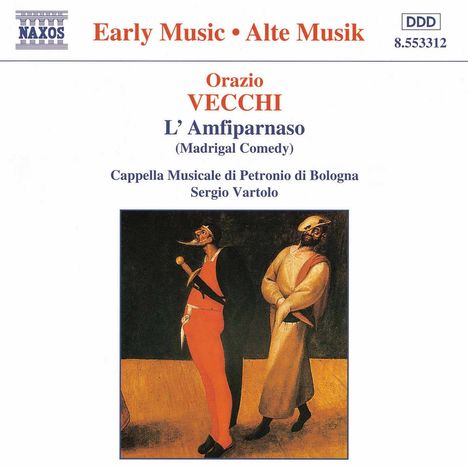Orazio Vecchi: L'Amfiparnaso auf CD
L'Amfiparnaso
Herkömmliche CD, die mit allen CD-Playern und Computerlaufwerken, aber auch mit den meisten SACD- oder Multiplayern abspielbar ist.
- Künstler:
- Vaccari, Pederzoli, Scabini, Goethem, Donato, Cappella Musicale di Petronio Bologna, Vartolo
- Label:
- Naxos
- Aufnahmejahr ca.:
- 1995
- Artikelnummer:
- 7691634
- UPC/EAN:
- 0730099431224
- Erscheinungstermin:
- 10.4.1996
- Serie:
- Naxos Early Music Collection
Vecchi war zu verschiedenen Zeiten mit anderen führenden Komponisten der Zeit befreundet. Im Jahr 1579 beteiligte er sich an einer feierlichen Sammlung, dem Trionfo di Musica, für die Hochzeit des Großherzogs Francesco mit Merulo und Andrea Gabrieli und veröffentlichte 1580 die erste seiner eigenen Canzonette-Folgen. Seine Madrigalkomödie L'Amfiparnaso wurde 1594 uraufgeführt und 1597 veröffentlicht. Der Text ist ein Werk des Bologneser Dichters Giulio Cesare Croce und wird in einer Reihe von Madrigalszenen präsentiert. Diese bieten eine Erzählung, die Charaktere aus der commedia dell'arte, den alten Mann Pantalone, den lächerlichen tollpatschigen Doktor Graziano aus Bologna, den prahlerischen Spanier Capitan Cardone, die Kurtisane Hortensia, die komischen Diener, den Chor der Juden und die ernsteren Figuren der jungen Liebenden Lucio und Isabella, Hirte und Hirtin, umfasst. Die im Titel angedeuteten Zwillingsgipfel des Pamassos sind die der Musik und der komischen Poesie, der erste in einem technisch vollendeten polyphonen Stil, der natürlicher mit relativ ernsten Themen verbunden ist, und der zweite in einem Stil, der vom Dichter Francesco Berni abgeleitet ist, im Gegensatz zum reinen und erhabenen Stil des Petrarca. Die Madrigale, aus denen sich die nebeneinander stehenden Szenen in einer Struktur zusammensetzen, die dem Zuhörer einen dramatischen Zusammenhang überlässt, sind fünfstimmig besetzt, mit Ausnahme der vierstimmigen Serenade von Doktor Graziano, einer Parodie eines Madrigals von Cipriano da Rore. Innerhalb der fünfstimmigen Textur wird eine kontrastierende dreistimmige Gruppe von drei Stimmen verwendet. Das Ergebnis unterscheidet sich von so etwas wie Oper, in der es ein zeitgenössisches Experiment gab. L'Amfiparnaso ist für den Zuhörer und nicht für den Zuschauer.
Product Information
Vecchi was associated at various times with other leading composers of the time. In 1579 he contributed to a celebratory collection, Trionfo di Musica, for the marriage of the Grand Duke Francesco, with Merulo and Andrea Gabrieli, and published the first of his own sets of Canzonette in 1580. His madrigal-comedy L'Amfiparnaso was first performed in 1594 and published in 1597. The text was the work of the Bologna poet Giulio Cesare Croce and is presented in a series of madrigal scenes. These offer a narrative that involves characters from the commedia dell'arte, the old man Pantalone, the ridiculous bumbling Doctor Graziano from Bologna, the bragging spaniard Capitan Cardone, the courtesan Hortensia, the comic servants, the chorus of Jews, and the more serious characters of the young lovers Lucio and Isabella, shepherd and shepherdess. The twin peaks of Mount Pamassus signified in the title are those of music and comic poetry, the first in a technically accomplished polyphonic style more naturally associated with relatively serious subjects and the latter in a style derived from the poet Francesco Berni, in contrast to the pure and elevated style of Petrarch. The madrigals that make up the juxtaposed scenes in a structure that leaves dramatic coherence to the listener are scored for five voices, with the exception of Doctor Graziano' s four-part serenade, a parody of a madrigal by Cipriano da Rore. Within the five-voice texture a contrasting group of three voices is used. The result is distinct from anything like opera, in which there was contemporary experiment. L'Amfiparnaso is for the listener rather than the spectator.
Rezensionen
H.C. Worbs im Musikmarkt 10/96: "Glücklicher weise wird mit soviel Witz, soviel Ausdruck und stimmlichem Maskenspiel gesungen, dass - mit der kurzen Inhaltsangabe des Booklets in der Hand - kaum etwas vom Reiz des Stückes verlorengeht."Disk 1 von 1 (CD)
L'Amfiparnaso (Madrigal-Komödie)
-
1 Prolog
-
2 Oh Pierulin (1. Akt)
-
3 Che volete voi dir
-
4 Hor per vegnir
-
5 Misero che farò (2. Akt)
-
6 Vien'à qua
-
7 Oh ecco il Capitano
-
8 Ecco che più non resta
-
9 Ah Isabella
-
10 Daspuò c'ho stabilio
-
11 Anchor ch'al parturire
-
12 Tich fach toch
-
13 Lassa che veggio
-
14 Rallegratevi meco
Mehr von Orazio Vecchi
-
Orazio VecchiLe Veglie di Siena (overo i varii humori della musica moderna / Venedig 1604)2 CDsAktueller Preis: EUR 27,99
-
L'Arte dei Piffari - Cornetts and Sackbuts in Early Baroque ItalyCDVorheriger Preis EUR 19,99, reduziert um 0%Aktueller Preis: EUR 7,99
-
Fa una canzone - Italienische Tänze & LiebesliederCDVorheriger Preis EUR 19,99, reduziert um 0%Aktueller Preis: EUR 7,99
-
Gruppo Vocale Arsi & Tesi - Il Trionfo Di Dori (Venedig 1592)CDVorheriger Preis EUR 17,99, reduziert um 0%Aktueller Preis: EUR 4,99






